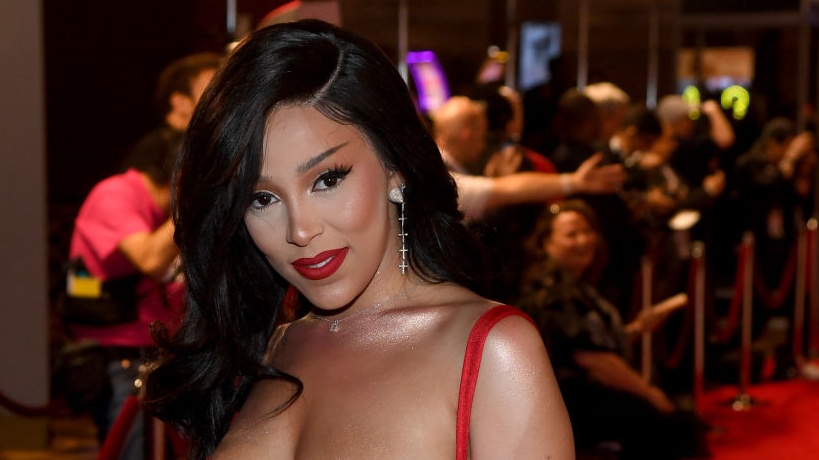Rapper and "Mooo!" artist Doja Cat took to Instagram Monday to apologize to fans she offended after reports surfaced this week about questionable song lyrics and alleged past participation in racist chat rooms.
According to Newsweek, videos and photos of the 24-year-old shared on various digital media sites suggested she was involved in an alt-right public chat, where she exchanged sexual messages with its members. The photos sparked discussions that made their way to social media along with the hashtags #OnlyKlans and #DojaCatisOverParty before the "Say So" artist got wind and tried to clear the air.
"I want to address what's been happening on Twitter," Doja Cat wrote on Instagram. "I've used public chat rooms to socialize since I was a child. I shouldn't have been on some of those chat room sites, but I personally have never been involved in any racist conversations. I'm sorry to anyone I offended."
The artist, whose name is Amalaratna Zandile Dlamini, said that she’s proud of her heritage as a Black woman. Her father, Dumisani Dlamini, is a famous South African actor and film producer best known for his work on Sarafina!
"I'm a black woman," she wrote. "Half of my family is black from South Africa and I'm very proud of where I come from."
After Doja Cat released the statement, she hosted an Instagram Live session to go into detail and further explain her actions.
#DojaCat apologizes for the “Dindu Nuffin” song and debunks Sandra Bland rumors. pic.twitter.com/MiEFNY8ENm
— BXM✨ (@blindedxmelanin) May 26, 2020
"The chat room that I go to is a public chat room. It's me and my friends, you go in there … I learned that there are racist people who come in and out of the chat," Dlamini said. "They're there. They happen, and then they're banned. The idea that this chat room is a white supremacist chat room is … I don't understand it in any way. Not even."
The Los Angeles native also spent time explaining her resurfaced song “Dindu Nuffin.”
According to The Source, the song’s title is a derogatory stylization of "didn't do nothing" and is a phrase that is used to mock Black people who experience police brutality. According to Know Your Meme, the term originated on 4chan as a response to the 2014 and 2015 riots.
After the song — which was released on Soundcloud in November 2015 — resurfaced, Twitter users ripped into the artist and accused her of creating the song as a response to Sandra Bland’s death that same year.
Doja Cat made a song mocking sandra bland who was a black woman murdered by police…somebody better come get this bitch before i do pic.twitter.com/LJBgsAUEr4
— IG: @sadis1ic (@sadis1ic) May 22, 2020
"The term that I used in the song is one that I learned that day so people were calling me it left and right and I used it in a song and it was kind of to take back and f**kin' say f**k you to those people," Dlamini said in response.
She then goes on to acknowledge that the song is bad, in a lyrical sense, but explains that it was not a commentary on Bland's death.
“As for the old song that’s resurfaced, it was in no way tied to anything outside of my own personal experience," she said. "It was written in response to people who often used that term to hurt me. I made an attempt to flip its meaning, but recognize that it was a bad decision to use that term in my music.”
"To see a song I made connected to an innocent Black woman's death is one of the most awful rumors I've ever encountered," she added.
Reactions to the "Rules" singer's apology were split.
Some believed she dug herself into a deeper pit with the apology.
Doja Cat ain’t sorry about nothing she did or said. The more she speaks, that becomes increasingly clear.
— You Know My Name (@LookAtDustin) May 26, 2020
once the coon chip is activated it can’t be deactivated that doja cat live didnt do shit ???? pic.twitter.com/EsusuIKGIu
— miles morales stan (@pinkgIosss) May 26, 2020
This all I heard in doja cats apology pic.twitter.com/IKJVWnLAfI
— Q (@isecuredthebag) May 26, 2020
But a separate wave of Twitter fingers believe the artist was sincere in her apology and feel others will come around soon.
Congrat , y’all believed some whack ass rumours from some annoying incel gamer boys pressed over some tits and attempted to cancel a legend . do some research of your own for once and don’t believe an absurd rumour from an anonymous source .fuck . #DojaCat
pic.twitter.com/MXJFIOcuhM— shit happens (@herh_wisen) May 26, 2020
Y’all clearly didn’t see doja cats ig live that apology was so genuine ???????????? OMG yes Stan #doja again ???????? pic.twitter.com/Im4hBqQpde
— O’Doyl (@YMOdoyl) May 26, 2020
DojaCat: *going on live explaining everything giving us a full on apology the best way she can*
People who don’t listen: “sHe sTiLl rAcisT”
Me: #DojaCat
pic.twitter.com/UrsTcOI46P— wEirDo (@tariibabyy) May 26, 2020
Doja Cat ended her apology by assuring fans that she was taking the criticism against her seriously and that she was determined to show everyone “that’s not my character” in her future endeavors.
